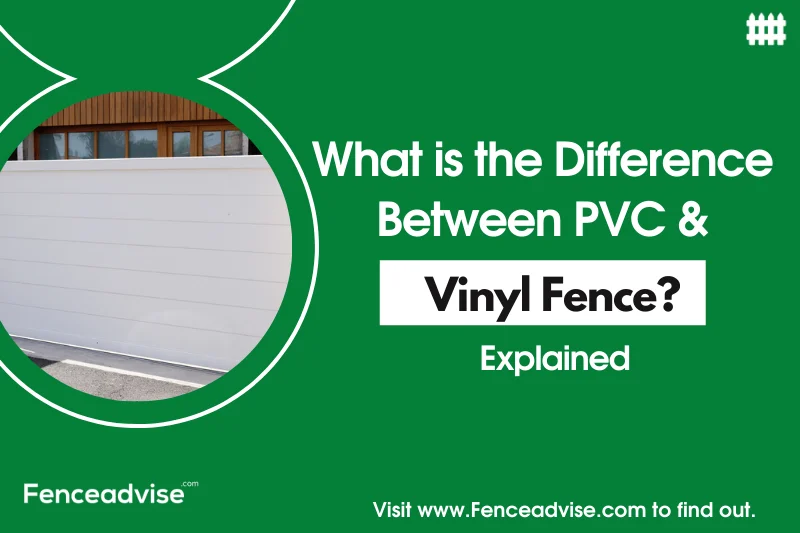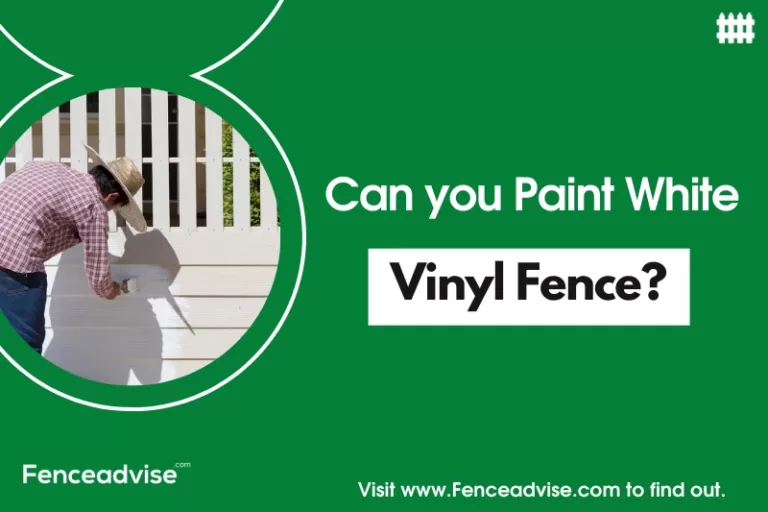We include products we think are useful for our readers. If you buy through links on this page, we may earn a small commission. Read our affiliate disclaimer here.
Vinyl and PVC fences are two types of fences that are commonly used in residential areas. Typical vinyl fences are flexible, making them easy to install. However, they do not last as long as other types of fence materials.
Vinyl is also more expensive than PVC fencing, which a laminated material is made from recycled plastics. When choosing between the two options, it is important to consider the durability and longevity of both products in addition to aesthetic appeal.
Is PVC Plastic The Same as Vinyl?
Vinyl is a type of rigid plastic. It is different from other types of plastics because vinyl has been manufactured using an alternative process called Vinyl-Clad Manufacturing, which combines a synthetic resin with a vinyl acetate polymer.
PVC, or Polyvinyl Chloride, is also a type of rigid plastic. It is different from other types of plastics because it has been manufactured using the traditional process of polymerizing vinyl chloride monomer.
Plastic is a general category that covers PVC and vinyl. Vinyl is the preferred material for window cladding because it is more durable than PVC, it has a better appearance (paintable), and installation is cheaper.
PVC vinyl can be used for window cladding if one does not care about the differences in durability and cost.
Talk to a Fence Contractor Near You
How Long Do PVC Fences Last?
PVC fences are made from polyvinyl chloride and they last indefinitely. That’s because PVC is a durable material that won’t rot or deteriorate.
The life of a PVC fence is determined by the quality of the material and installation. It also depends on the climate conditions where it is installed.
A PVC fence can be used for many things, including for residential installations, as well as for commercial developments. A PVC fence is strong and won’t break or bend easily. It’s also versatile because it can be installed in any shape or size that you’d like.
PVC fences are a type of fence that is relatively inexpensive, durable, and quick to install. If you live in a climate where snow piles up, it’s important to know how long PVC fences last.
PVC fences typically last 10 years if they are installed properly. However, if the ground under the fence is not compacted properly and/or the fence posts are not set deep enough, the posts can warp and eventually break.
PVC fences last long, but they will degrade over time. This means that after a few years, they will need to be replaced.
Find the right fence contractor for your project
Read More:
- How Long Does Vinyl Fence Last?
- How to Install Vinyl Fence on top of Block Wall?
- Can you Fill Vinyl Fence Posts with Concrete?
Is PVC Vinyl Fence Safe or Not?
PVC vinyl is a popular alternative to leather. It is often used for purses and other accessories because it is cheaper and easier to clean. PVC vinyl is not as durable as leather, but it is often more resistant to stains.
PVC vinyl is a relatively safe material. It contains no additives that can cause irritation.
The only risk associated with using PVC vinyl is if it’s heated over a certain temperature. If the temperature goes over 240 degrees Fahrenheit, it may release a chemical called dioxin that can be harmful to humans. If you are concerned about the safety of PVC vinyl, you can buy products with natural leather, which is usually more expensive.
Get Matched with Local Fence Professionals
Answer a few questions and we’ll put you in touch with pros near you.
What Is a Stronger PVC or Vinyl Fence?
Both PVC and vinyl are synthetics that are used to make a variety of products. Both vinyl and PVC are made from the same kind of resin. The difference is the additives and processing agents used in their creation.
PVC is one of the most common plastics in use today, and vinyl is its synthetic relative. Vinyl is a polymer and PVC is a thermoplastic. Both PVC and vinyl have their pros and cons. PVC, for instance, is more durable, but it’s also more toxic than vinyl.
PVC is stronger than vinyl because PVC has higher tensile strength and compressive strength. Vinyl has a lower tensile strength and compressive strength than PVC does.
Can Vinyl Fence Be PVC Free?
Vinyl is a material that can be used in a variety of industries, most notably in the manufacturing of flooring and roofing materials. Vinyl is a plastic material that contains PVC, which has been classified as a carcinogen by the World Health Organization.
While many vinyl manufacturers have taken steps to reduce or eliminate the use of PVC, it still remains an integral part of vinyl production. This means that there is currently no way to manufacture vinyl without the use of PVC.
Get Free Quote
Quickly Find a Fence Installation, Repair Contractor Near you
Looking for a reliable fence installation or repair contractor in your area? Look no further! Fill out the form below to receive a free, no-obligation quote from one of our experienced professionals.
Our contractors are experienced and dedicated to providing the highest quality fence services. With a quick response time and competitive pricing, you can trust us to handle all of your fencing needs. Get started today and see the difference a high-quality fence can make for your property!
Is Vinyl Fence Always PVC?
Vinyl is a type of plastic that is most commonly used for records and other objects that are prone to scratches. Vinyl is not always PVC. They can also be made out of acetate, vinyl chloride, and polyvinyl acetate.
Many people confuse vinyl with your typical PVC pipe, which is a different material altogether. While they do share some properties (e.g., the material used to create them), the similarities end there. Vinyl records are not used in plumbing systems because they are more susceptible to scratching and therefore less durable.
There are many types of vinyl that are not PVC, such as vinyl fencing, window clings, and even car decals. These are made from polyvinyl chloride (PVC), but they do not share the same properties as vinyl records.
Why Is the PVC Price Going Up?
PVC prices have been steadily increasing in the last few years, with prices expected to be up by 8% per year. PVC prices are expected to increase due to the rising cost of raw materials, labor, and demand for PVC.
There are many factors contributing to the steep rise in PVC prices. Raw material costs have increased over time due to a number of factors, including an increase in oil prices. Shopping malls are also demanding more PVC price-tagged products because of their popularity among consumers as well as their low cost to make.
Conclusion
A PVC fence is a much more durable option that can also be installed for less money than a vinyl fence. If you are looking for fencing for your home, it’s important to know the differences between these materials and which one will work best for you.
At FenceAdvise, we pride ourselves on being the most reliable and trustworthy source of fencing information. Our articles are based on only the highest quality sources, including peer-reviewed studies, to ensure that our readers always have access to accurate information. Read more about our Editorial Guidelines, About Us.



